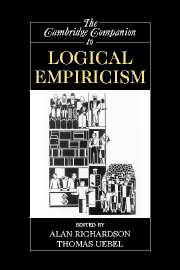Book contents
- Frontmatter
- Introduction
- Part I The Historical Context of Logical Empiricism
- Part II Logical Empiricism: Issues in General Philosophy of Science
- Part III Logical Empiricism and the Philosophy of the Special Sciences
- 7 The Turning Point and the Revolution: Philosophy of Mathematics in Logical Empiricism from Tractatus to Logical Syntax
- 8 Logical Empiricism and the Philosophy of Physics
- 9 Logical Empiricism and the Philosophy of Psychology
- 10 Philosophy of Social Science in Early Logical Empiricism: The Case of Radical Physicalism
- 11 Logical Empiricism and the History and Sociology of Science
- Part IV Logical Empiricism and its Critics
- Bibliography
- Index
- Series List
9 - Logical Empiricism and the Philosophy of Psychology
from Part III - Logical Empiricism and the Philosophy of the Special Sciences
Published online by Cambridge University Press: 28 January 2008
- Frontmatter
- Introduction
- Part I The Historical Context of Logical Empiricism
- Part II Logical Empiricism: Issues in General Philosophy of Science
- Part III Logical Empiricism and the Philosophy of the Special Sciences
- 7 The Turning Point and the Revolution: Philosophy of Mathematics in Logical Empiricism from Tractatus to Logical Syntax
- 8 Logical Empiricism and the Philosophy of Physics
- 9 Logical Empiricism and the Philosophy of Psychology
- 10 Philosophy of Social Science in Early Logical Empiricism: The Case of Radical Physicalism
- 11 Logical Empiricism and the History and Sociology of Science
- Part IV Logical Empiricism and its Critics
- Bibliography
- Index
- Series List
Summary
Logical empiricism, as is well known, was deeply intertwined with both physics and logic. Rudolf Carnap, Philipp Frank, Hans Hahn, Hans Reichenbach, Moritz Schlick, Friedrich Waismann, and, later, Herbert Feigl and Carl Hempel all pursued research programs inspired particularly by the achievement of relativistic physics and informed, to quite various degrees, by such accomplishments in logic as Gottlob Frege's account of mathematical knowledge, David Hilbert's program of axiomatization and implicit definition, Ludwig Wittgenstein's Tractatus, Bertrand Russell's theory of types, Kurt Gödel's incompleteness results, and Alfred Tarski's theory of truth. Quite often these thinkers were not merely inspired by the profound achievements of relativity and mathematical logic, but (as in the case of Schlick and Reichenbach especially) developed, as their own central philosophical projects, accounts of the validity and objectivity they took to be embodied in these advances in the natural and formal sciences. Thus to a considerable extent the history of logical empiricism reflects, and even parallels, the history of physics and logic in the late nineteenth and early twentieth centuries.
Yet a review of logical empiricists' writings reveals an affinity toward and a growing interest in behaviorism, neobehaviorism, Gestalt, and psychophysics - varieties of experimental psychology that flourished in the 1920s and 1930s.
- Type
- Chapter
- Information
- The Cambridge Companion to Logical Empiricism , pp. 228 - 249Publisher: Cambridge University PressPrint publication year: 2007
- 4
- Cited by



